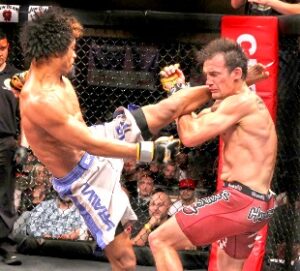Have you seen a fight in the UFC result in a no-contest? Maybe you’re confused by the decision of the referee to award a no-contest, or possibly you’re unsure of what a no-contest is.
In this article, we’ll take a look at what a no contest means, the causes, how they affect betting and fighter payment, and the most well-known incidents.
Contents
- What Is a No-contest in the UFC?
- What Else Causes No-contests?
- When Is a No-contest Not Given?
- Does a No-contest Mean the Fight Is a Draw?
- What Happens to Any Bets on a Fight Declared as a No-contest?
- Do UFC Fighters Get Paid for a No-contest?
- What Are the Most Famous No-contests in the UFC?
- What Does NC Mean in UFC?
What Is a No-contest in the UFC?
Taken from the Official Rules of MMA, a no contest is declared when a contestant is prematurely stopped due to an accidental injury and a sufficient amount of time has not been completed to render a decision via the scorecards.
Put another way, a no-contest is a decision given by a referee for a fight ending early due to an accidental injury, and the fight is stopped before half of the scheduled rounds have been completed.
Stopping before half of the scheduled rounds in a three-round fight means the fight ended before 2 minutes and 30 seconds of the second round. In a five-round fight, it means the fight ended before 2 minutes and 30 seconds of the third round.
What Else Causes No-contests?
As mentioned, a no-contest is the result of a fight ending because of an accidental foul – but this is not the only way a fight can be declared a no-contest.
Here’s a complete list:
Unintentional illegal strikes resulting in a fighter being unable to continue – Knees or kicks to the head of downed opponents, eye pokes, groin strikes, butting of heads. These are the most common illegal strikes, and also the strikes most deemed unintentional; therefore resulting in a no contest.
Accidental injury to one or both fighters – Mostly seen in a fight-ending sequence that the referee deemed as affecting the fight result, such as a clash of heads that disorientated one or both fighters.
Positive pre-fight drug tests of either fighter – If a fighter wins and is then flagged for an illegal substance, the fight is overturned and results in a no-contest.
Match-fixing suspicion – This has never resulted in a no contest before, but it can happen if the sports commission believes that match-fixing has occurred.
Interference in the fight by a referee or a non-participating third party – Defined as any action disrupting the fight or causing an unfair advantage for a fighter. A fighter’s corner isn’t allowed to distract the referee and this could result in a no-contest if they did.
Ring issues making a fair fight impossible – This could be disruption caused by fans or structural problems with the octagon.
Post-fight appeals – These take some time after the fight has finished but normally overturn a poor decision by a referee.
Unforeseen non-combat-related issues – Anything else not related to fighting that could alter the fairness or result of a fight.
When Is a No-contest Not Given?
A no-contest is not given when a fight ends due to an accidental injury if the injury happens after half of the scheduled rounds.
In this situation, the fight will result in a technical decision, in which the judge’s scorecards are used to determine the winner.
No contests are also not given if the referee deems a foul as intentional, and the foul has left a fighter unable to continue. This results in a disqualification regardless of time or rounds passed.
Does a No-contest Mean the Fight Is a Draw?
A no-contest is not a draw and is considered a null and void result.
Draws are results given to fights that go the distance, and no contests are decisions given to fights stopped prematurely, or in some cases when a fight is overturned.
When a no contest is given, there is no winner or loser, and is seen on fighters’ records at the end, typically in brackets as “NC”. It’s also sometimes omitted, as seen on the official UFC website.
For example, Jon Jones’s record may look like this:
- 26-1-0 (1 NC)
- 26-1-0, 1NC
- 26-1-0
What Happens to Any Bets on a Fight Declared as a No-contest?
As a no-contest decision is considered a null and void result, all bets are returned to the bettor.
However, if a fight outcome is later changed to a no-contest, bets will not be reversed as the wager is determined by the initial outcome of the fight.
For example, Daniel Cormier vs Jon Jones 2 (UFC 214) resulted in a knockout win for Jones, and anyone betting on Jones to win would have won their bet.
However, three weeks after the event, the results of Jones’s pre-fight drug test came back positive for banned substances, and the fight was overturned to a no contest.
As too much time had passed since the initial result, the bet results remained the same as before the overturned no contest.
Therefore, It’s important to check the null and void rules with every betting site before you make a bet, as each betting agent will have slightly different rules. For example, null and void payouts may be dependent on the time passed after the initial event.
Do UFC Fighters Get Paid for a No-contest?
UFC fighters do get paid for a no-contest, but they’re not paid in full.
Fighters are paid show money, which is the pre-fight contracted amount a fighter receives for making weight and showing up to fight. Each fighter will be contracted a different amount as negotiated by the UFC and a fighter’s agent.
To receive show money, a fighter doesn’t need to fight, as a fight can result in a no-contest before the fight even begins. This is why they are paid to show, and not to fight.
However, a no-contest decision means neither fighter gets paid a winner’s fee.
The unlikely exception is if a fighter wins initially, and then the outcome of the fight is later changed to a no-contest. In this scenario, the initial winner would likely keep their win money.
Fighters can still win the other bonuses on offer, but it’s unlikely if the contest is cut short.
Overall, no-contest decisions see fighters losing money which is one of the main reasons they are disliked.
What Are the Most Famous No-contests in the UFC?
Let’s look at some of the most famous no-contests in the UFC, and their causes.
Anderson Silva Vs Nick Diaz (UFC 183) – Anderson Silva won the fight via unanimous decision, but the result was overturned and given as a no-contest when it was found that both fighters tested positive for banned substances in their pre-fight test.
Daniel Cormier vs Jon Jones 2 (UFC 214) – Jon Jones knocked out Daniel Cormier in the third round and won via TKO. However, three weeks later the result was overturned and given as a no-contest when Jones’s pre-fight tests came back positive for banned substances.
Greg Hardy vs Ben Sosoli (UFC on ESPN 6) – Greg Hardy won the fight via unanimous decision but the fight was overturned and given as a no-contest when it was found that Hardy had used an inhaler during a rest period between rounds. Could also be said to have been caused by third-party interference, as it was Hardy’s corner that gave him the inhaler; after being heard asking if he was allowed to use it.
Eddie Alvarez vs Dustin Poirier (UFC 211) – The fight prematurely ended in the second round and was given as a no-contest after Herb Dean deemed Alvarez’s illegal knees on Poirier as unintentional. This was officiated incorrectly as it was past the halfway point of scheduled rounds, and therefore should have resulted in a point deduction for Alvarez and a technical decision for Poirier.
Gray Maynard vs Rob Emerson (TUF 5 Finale) – The fight ended in the second round and was given as a no-contest after Maynard slammed Emerson into the ground, knocking himself unconscious in the process. As both fighters were unable to continue due to an accidental injury (double knockout), a no-contest was declared.
Yair Rodriguez vs Jeremy Stephens (UFC Fight Night 159) – The fight ended early and was given as a no-contest after Rogriguez eye poked Stephens. Stephens was unable to continue and as the fight was stopped so early, no contest was the correct decision.
Kevin Holland vs Kyle Daukaus (UFC Fight Night 193) – Daukaus believed he had won after knocking out Holland in the first round. However, due to an accidental clash of heads preceding a fight-ending sequence, the fight was declared a no-contest.
Alessio Sakara vs Ron Faircloth (UFC 55) – The fight ended early in the second round due to an unintentional illegal groin strike by Faircloth. Sakara was unable to continue, and as it was before halfway through the scheduled rounds, a no contest was the correct decision.
Marcus Silveira vs Kazushi Sakuraba (UFC Japan) – Referee John McCarthy prematurely ended the fight as he thought that Sakuraba had been knocked out by a punch while he was going in for a takedown. Sakuraba pleaded his case and the fight was overturned to a no contest.
Chas Skelly vs Bobby Moffett (UFC Fight Night 139) – Referee Tim Mills made a huge blunder in ending the fight early when Skelly was in an armbar but was perfectly fine. Two years after the fight the decision was overturned and given as a no-contest.
What Does NC Mean in UFC?
As mentioned, a no-contest is a decision caused by various different factors, but simply put, NC or no contest in the UFC means the result is null and void; which is why it’s often omitted from a fighter’s record.
As much as they’re a nuisance to see, no contests are a crucial part of the UFC as they help reinforce the rules and promote fairness.




